Rochester farmers have pleaded with Victorians not to forget them, as the community grapples with its “new normal” two months after devastating floods.
The once vast piles of rubbish, carpets and washing machines littering the town’s nature strips have been carted away and the lush green verges give no hint of the hard rubbish collections that were so recently there.
However, there is a sense the town is coming close to an emotional breaking point.
The community is facing a summer without a swimming pool, with the once crystalline blue waters of its Olympic-sized oasis now transformed to a swamp-like brown.
Many of the picturesque houses look neat and tidy from the outside, but beyond the front doors they are revealed to be little more than gutted shells.
Many families have sent their kids to live with relatives outside the area, or are staying together in caravans on the lawn.
Retirees in their 70s are living in sheds, worried they will be in there for another year before their homes are liveable again.
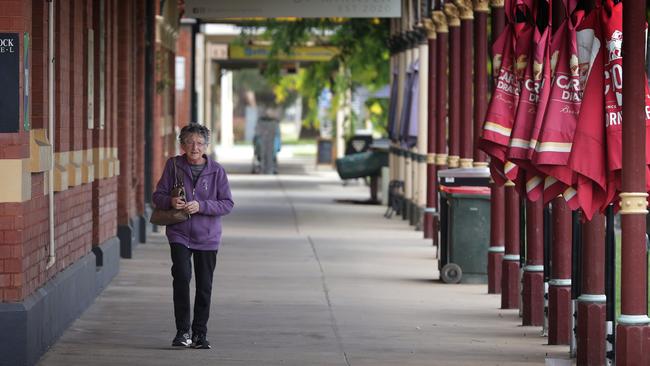
Dozens more are living in a gated caravan community in Elmore.
Rochester farmer Jenny Weeks said the region’s legendary resilience was stretched to its limits.
“Farmers are so strong in themselves, they don’t admit they need help. They do need it. But, they won’t ask for it,” she said.
“The resilience has been so strong but you can just start to see the cracks now. I cry every day. I don’t know what triggers it. I might even cry talking about it now.”
The local footy oval, home of the Rochester Tigers, was used on Thursday as an emergency response point for the region’s farmers to gather for emotional and material support.
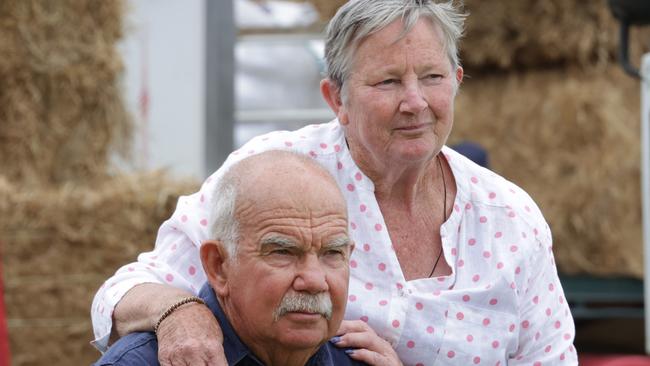
Many were close to tears as they received free bales of hay from the Rapid Relief Team charity arm of the Plymouth Brethren Christian Church.
The organisation provided 1120 bales of A-grade stock feed and volunteers set up a tent to give out free coffees and hamburgers.
RRT director Lester Sharples said the floods had decimated livestock, hay supplies and crops and flooded farm houses in the region, leaving many close to the end of their tether.
Cattle farmer Allan Matthews, from nearby Kerang, embraced volunteer Nathan Pederick as he spoke about how much the gift of hay meant to him.
“It’s like liquid gold,” he said.
“It means so much more than just money.”
“I have never asked for help, I have always stood on my own two feet.
“This is way out of my comfort zone. It’s something I never thought I would do,” he said of accepting the hay bales.

Mr Matthews said he had not been able to access much government support because he did not have an Australian Business Number for his farm.
“The flood didn’t discriminate, it came through whether you had an ABN or not,” he said.
“That’s why this just means so much to me. The (RRT) aren’t asking anything from me they are just giving me the hay. I have been struggling physically and mentally and I don’t know if I will get through it but coming here today — when I leave I will feel better — by about five per cent which will help me get through this.”
Sheep farmer Merle Stirling gave up her teaching position seven years ago to help her father manage his rural property.
“The trucks came out and delivered the hay to our place last night and we were feeding it to the sheep this morning,” she said.
“We got 16 bales and our neighbours had a telehandler and they helped us unload it.”
Ms Stirling’s father turned 85 just four days after the flood hit.
“We’re about five minutes out of Rochester and we have 900 sheep. The house is 142 years old and the water came up through the floorboards. All the carpet and lino had to be removed.”
In town many estimate that as many as 90 per cent of the housing stock was damaged.
In a shed close to the footy oval, Marj and Will Dingwall are making tea and eating a store bought Christmas cake while “camping”.
“We had a caravan and we would take it everywhere on holidays in the past but I never thought we’d be camping in our 70s,” Mrs Dingwall said.
She can’t use her oven or kitchen and is instead using a slow cooker and a barbecue in the shed to prepare meals. It’s a far cry from the way she usually lives.
“There are so many things I would usually make for myself — like Christmas cake — that we just have to buy now instead.”
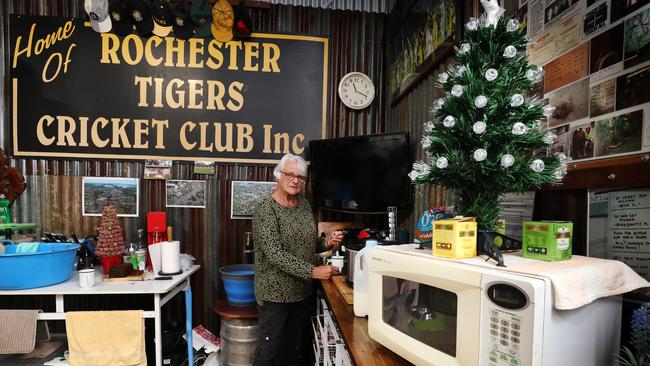
An electric blue tinsel Christmas tree stands in the living / bedroom area of the shed, a reminder of the festive season.
A tour of their home reveals that the insides of their four-bedroom house have been stripped of internal walls, electrical wiring and floor coverings.
Mr and Mrs Dingwall are still waiting to hear from their insurance company whether the house will be fully repaired or if the company will order a knock down and rebuild.
“We still just don’t know,” Mr Dingwall said.
“But we know that we’re in for the long haul.”
The pair is adamant they will stay in Rochester, regardless of the outcome.
Others are worried that families will take their insurance payouts and choose to leave the area rather than stay on and rebuild.
In the centre of town, hairdresser Leisa Cody has reopened her salon, Gypseastorm, and has a regular group of clients coming through the doors.
The salon is in good order, but her 100 year old home on Moore St has been written off by her insurance company.
“I can’t really face Christmas this year, I’m a bit of a grinch right now,” she said.
“Some people are saying they can’t face the possibility of another flood because they recovered after the one in 2011 and now this has happened and they are moving out.
“We will see what happens.”
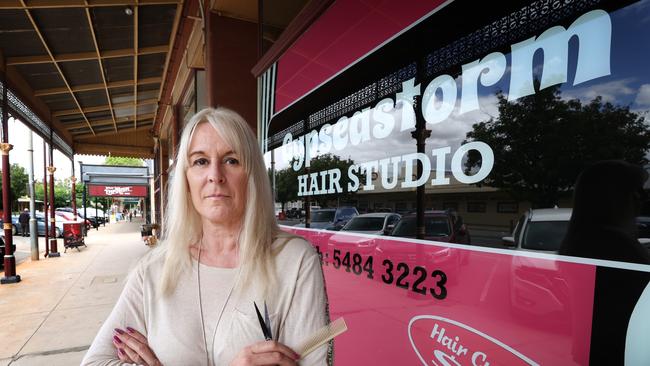
Her salon is close to the Rochester pool, which is the home of many school swimming carnivals in the district, as well as learn to swim classes.
Mother of 11-year-old Taylor and nine-year-old Lacey, Mindy Murray grew up in the town and wants the pool fixed.
“It’s so important to us. It’s a social gathering spot which we really need, especially now. The kids need it and so many people come in to town to use it because it’s Olympic sized,” she said.
“A lot of us are really worried the council will just close it for good, but it’s something that’s really important to the wellbeing and future of our town.”
Others are determined to improve facilities for Rochester children, as well.
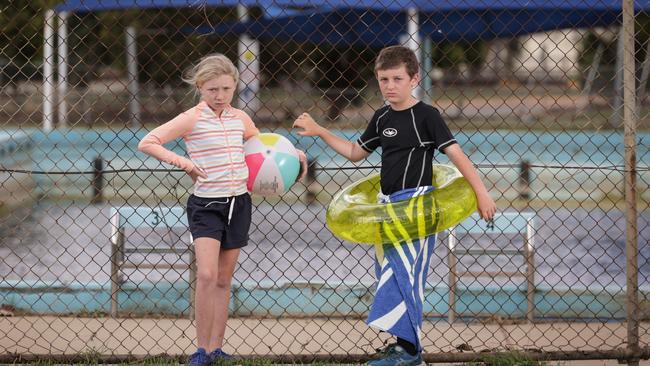
At the St Joseph’s Catholic Primary School in Campaspe street, principal Liz Trewick had been spending the last days of term planning out the next steps of the recovery.
She wants her students back at home where they can be together and return to a feeling of normalcy.
“We have had kids in years three to six spend 2700 minutes on buses in 30 days,” she said.
The school has had to billet them along with their teachers to other schools outside the area.
“Our prep to grade two classes have spent 900 minutes on the buses because we have been able to get room for them at Elmore.”
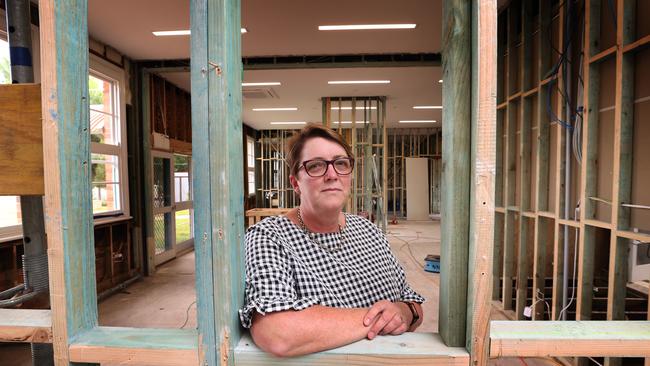
Ms Trewick is determined to have the school reopened for all of its students on day one of school next year.
The grades five and six classrooms have been stripped to a skeleton of wooden frame work and brick veneer, with driers working furiously under the flood to extract water so the next stage of work can begin.
Across the schoolyard, the classroom doors open to reveal pristine new rooms that smell of fresh paint and carpet. These rooms are already prepared for next year.
“We’ve had terrific help and support,” she said.
“My message to the school is ‘we’ve got this’ for us it’s about being together and working together to get our place up and running so our community can be together again. We have a long way to go.”

Add your comment to this story
To join the conversation, please log in. Don't have an account? Register
Join the conversation, you are commenting as Logout
Bendigo man’s wild alleged crime spree while on bail revealed
An alleged Bendigo crook who police say committed several burglaries while on bail for a methed-up joyride behind the wheel has launched an audacious attempt at getting bail again.
Where Victoria’s fraudsters are looming large revealed
Scammers and swindlers are targeting Melbourne’s inner-city suburbs, with new data revealing the worst suburbs for white collar crime in Victoria.